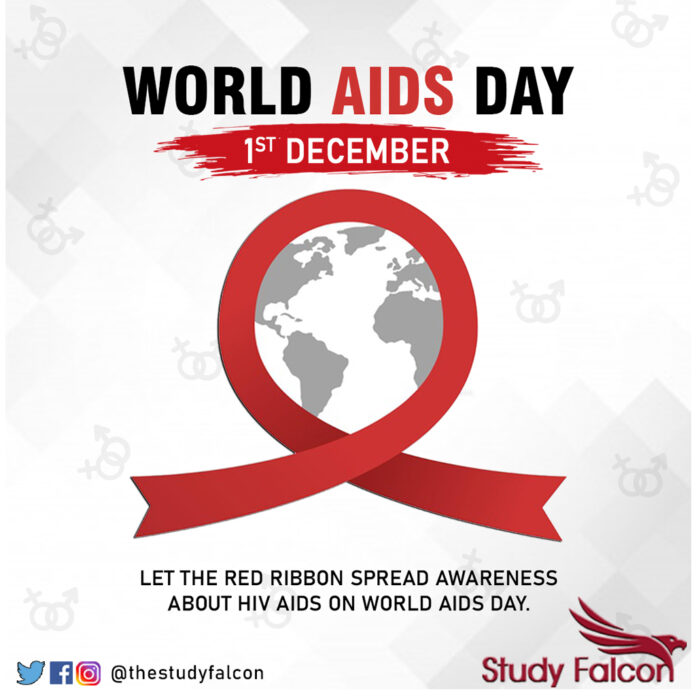First recognized in 1988, World AIDS Day falls on December 1 each year to raise awareness about the disease. AIDS or Acquired Immuno Deficiency Syndrome is a pandemic disease that is caused by the Human Immunodeficiency Virus (HIV). AIDS or Acquired Immuno Deficiency Syndrome is a pandemic disease that is caused by the Human Immunodeficiency Virus (HIV). The disease leads to a weak immune system and people get exposed to more vulnerable infections and diseases.
HIV is found in all the tissues, transmitted via blood, semen, breast milk, etc. It mainly affects the T-cells in the immune system and it is transmitted through blood transmission, sexual contact, etc. HIV symptoms include joint pain, fever, muscle ache, sore throat, weight loss, weakness, among others.
This year the theme of World AIDS Day 2020 is ending the epidemic: Resilience and impact which is a call to all the organisations and individuals around the world to raise awareness about this epidemic, increase the knowledge about this disease and speak out against the prevailing HIV stigma.
With the increased efforts undertaken to raise public awareness about HIV and AIDS in the last decade, fighting against the human immunodeficiency virus is possible and patients suffering from these diseases now have access to proper medical care. However, even though the awareness about AIDS and HIV has increased but still millions of people around the world continue to contract HIV and die of the last stage of the virus’s infection, AIDS.
The early symptoms of the disease include – fever, sore throat, skin rashes, nausea, general body aches and pain, headaches and stomach upset etc. As the infection progresses, the disease further weakens the immune system of the individuals and they undergo weight loss and can have diarrhoea and swollen lymph nodes. This makes early detection and treatment extremely important for HIV patients.
In 2020, the world’s attention has been focused by the COVID-19 pandemic on health and how pandemics affect lives and livelihoods. COVID-19 is showing once again how health is interlinked with other critical issues, such as reducing inequality, human rights, gender equality, social protection and economic growth. With this in mind, this year the theme of World AIDS Day is “Global solidarity, shared responsibility“.
COVID-19 has demonstrated that, during a pandemic, no one is safe until everyone is safe. Leaving people behind is not an option if we are to succeed. Eliminating stigma and discrimination, putting people at the centre and grounding our responses in human rights and gender-responsive approaches are key to ending the colliding pandemics of HIV and COVID-19.
The COVID-19 pandemic has revealed the entrenched inequalities existing in our societies. This health crisis, like many others, is hitting the poorest and the most vulnerable the hardest.
The COVID-19 crisis has exacerbated the challenges faced by people living with HIV, women and girls and key populations, including in accessing life-saving health care, and the crisis has widened the social and economic inequalities that increase the vulnerability of marginalised groups to HIV.
The leadership and engagement of communities, instrumental in the success of the AIDS response, has also been key in responding to COVID-19. There are countless examples of how community activism and solidarity have been paramount in providing people affected by HIV with information, services, social protection and hope. However, such solidarity cannot be the sole responsibility of communities. Governments, donors, faith leaders, civil society and each and every one of us need to contribute to making the world a healthier place.
It is very important for every person to first check to the Doctors for a proper treatment when anyone is not feeling well. Every people is used to get the proper type of knowledge from many of the Internet Web sites and also from the News Channels.
It is likely to get involved in many of the activities due to the proper usage of the techniques which can be able to give people relief from different activities. Many of the people are used to develop appropriate techniques for making a better vaccination for the people who are suffering from deadly diseases.
AIDS is a disease that is very hard to cure, and it has many symptoms that are not known by many of the people as they are not gone through the Disease. World AIDS Day makes the people to get all the knowledge about AIDS and to make the people understand it’s Symptoms.
Government nowadays is used to tell people to use Condoms as it prevents the person to get infected by AIDS Disease. It is straightforward for the people to use the Condoms, but it has some of the limitations that it sometimes cannot make HIV get into the body of the person.
Doctors recommended every people to get some treatment for the prevention of HIV AIDS. There are many Camps of the HIV-AIDS are organized by the Government to make every people know about the HIV-AIDS Disease.
Children in many of the Schools, as well as Colleges, are used to get the knowledge from their Books about the HIV-AIDS, and it is very important for them to get information about the dangerous Diseases. Scientists are trying hard to find and search for lots of vaccines of AIDS.
Government through the media and News Channels spread the Causes, Effects, Cure as well as Prevention of the AIDS. The government has also published AIDS Disease on the Internet to give every people knowledge about AIDS.










